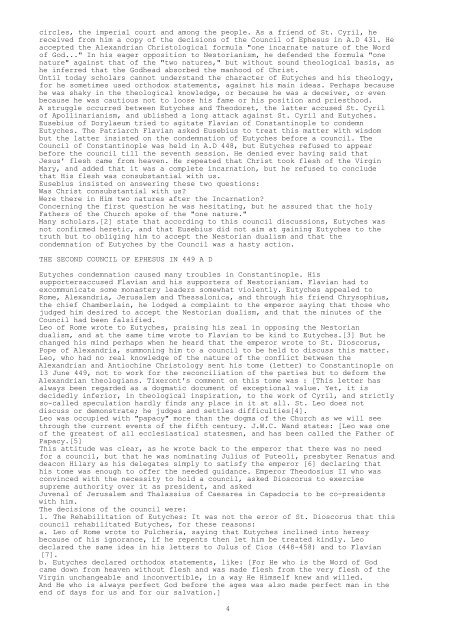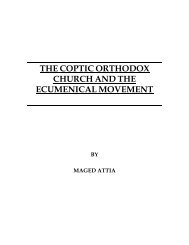Coptic interpretations of the Fourth Ecumenical Council - Saint Mina ...
Coptic interpretations of the Fourth Ecumenical Council - Saint Mina ...
Coptic interpretations of the Fourth Ecumenical Council - Saint Mina ...
Create successful ePaper yourself
Turn your PDF publications into a flip-book with our unique Google optimized e-Paper software.
circles, <strong>the</strong> imperial court and among <strong>the</strong> people. As a friend <strong>of</strong> St. Cyril, he<br />
received from him a copy <strong>of</strong> <strong>the</strong> decisions <strong>of</strong> <strong>the</strong> <strong>Council</strong> <strong>of</strong> Ephesus in A.D 431. He<br />
accepted <strong>the</strong> Alexandrian Christological formula "one incarnate nature <strong>of</strong> <strong>the</strong> Word<br />
<strong>of</strong> God..." In his eager opposition to Nestorianism, he defended <strong>the</strong> formula "one<br />
nature" against that <strong>of</strong> <strong>the</strong> "two natures," but without sound <strong>the</strong>ological basis, as<br />
he inferred that <strong>the</strong> Godhead absorbed <strong>the</strong> manhood <strong>of</strong> Christ.<br />
Until today scholars cannot understand <strong>the</strong> character <strong>of</strong> Eutyches and his <strong>the</strong>ology,<br />
for he sometimes used orthodox statements, against his main ideas. Perhaps because<br />
he was shaky in <strong>the</strong> <strong>the</strong>ological knowledge, or because he was a deceiver, or even<br />
because he was cautious not to loose his fame or his position and priesthood.<br />
A struggle occurred between Eutyches and Theodoret, <strong>the</strong> latter accused St. Cyril<br />
<strong>of</strong> Apollinarianism, and ublished a long attack against St. Cyril and Eutyches.<br />
Eusebius <strong>of</strong> Dorylaeum tried to agitate Flavian <strong>of</strong> Constantinople to condemn<br />
Eutyches. The Patriarch Flavian asked Eusebius to treat this matter with wisdom<br />
but <strong>the</strong> latter insisted on <strong>the</strong> condemnation <strong>of</strong> Eutyches before a council. The<br />
<strong>Council</strong> <strong>of</strong> Constantinople was held in A.D 448, but Eutyches refused to appear<br />
before <strong>the</strong> council till <strong>the</strong> seventh session. He denied ever having said that<br />
Jesus' flesh came from heaven. He repeated that Christ took flesh <strong>of</strong> <strong>the</strong> Virgin<br />
Mary, and added that it was a complete incarnation, but he refused to conclude<br />
that His flesh was consubstantial with us.<br />
Eusebius insisted on answering <strong>the</strong>se two questions:<br />
Was Christ consubstantial with us?<br />
Were <strong>the</strong>re in Him two natures after <strong>the</strong> Incarnation?<br />
Concerning <strong>the</strong> first question he was hesitating, but he assured that <strong>the</strong> holy<br />
Fa<strong>the</strong>rs <strong>of</strong> <strong>the</strong> Church spoke <strong>of</strong> <strong>the</strong> "one nature."<br />
Many scholars.[2] state that according to this council discussions, Eutyches was<br />
not confirmed heretic, and that Eusebius did not aim at gaining Eutyches to <strong>the</strong><br />
truth but to obliging him to accept <strong>the</strong> Nestorian dualism and that <strong>the</strong><br />
condemnation <strong>of</strong> Eutyches by <strong>the</strong> <strong>Council</strong> was a hasty action.<br />
THE SECOND COUNCIL OF EPHESUS IN 449 A D<br />
Eutyches condemnation caused many troubles in Constantinople. His<br />
supportersaccused Flavian and his supporters <strong>of</strong> Nestorianism. Flavian had to<br />
excommunicate some monastery leaders somewhat violently. Eutyches appealed to<br />
Rome, Alexandria, Jerusalem and Thessalonica, and through his friend Chrysophius,<br />
<strong>the</strong> chief Chamberlain, he lodged a complaint to <strong>the</strong> emperor saying that those who<br />
judged him desired to accept <strong>the</strong> Nestorian dualism, and that <strong>the</strong> minutes <strong>of</strong> <strong>the</strong><br />
<strong>Council</strong> had been falsified.<br />
Leo <strong>of</strong> Rome wrote to Eutyches, praising his zeal in opposing <strong>the</strong> Nestorian<br />
dualism, and at <strong>the</strong> same time wrote to Flavian to be kind to Eutyches.[3] But he<br />
changed his mind perhaps when he heard that <strong>the</strong> emperor wrote to St. Dioscorus,<br />
Pope <strong>of</strong> Alexandria, summoning him to a council to be held to discuss this matter.<br />
Leo, who had no real knowledge <strong>of</strong> <strong>the</strong> nature <strong>of</strong> <strong>the</strong> conflict between <strong>the</strong><br />
Alexandrian and Antiochine Christology sent his tome (letter) to Constantinople on<br />
13 June 449, not to work for <strong>the</strong> reconciliation <strong>of</strong> <strong>the</strong> parties but to deform <strong>the</strong><br />
Alexandrian <strong>the</strong>ologians. Tixeront's comment on this tome was : [This letter has<br />
always been regarded as a dogmatic document <strong>of</strong> exceptional value. Yet, it is<br />
decidedly inferior, in <strong>the</strong>ological inspiration, to <strong>the</strong> work <strong>of</strong> Cyril, and strictly<br />
so-called speculation hardly finds any place in it at all. St. Leo does not<br />
discuss or demonstrate; he judges and settles difficulties[4].<br />
Leo was occupied with "papacy" more than <strong>the</strong> dogma <strong>of</strong> <strong>the</strong> Church as we will see<br />
through <strong>the</strong> current events <strong>of</strong> <strong>the</strong> fifth century. J.W.C. Wand states: [Leo was one<br />
<strong>of</strong> <strong>the</strong> greatest <strong>of</strong> all ecclesiastical statesmen, and has been called <strong>the</strong> Fa<strong>the</strong>r <strong>of</strong><br />
Papacy.[5]<br />
This attitude was clear, as he wrote back to <strong>the</strong> emperor that <strong>the</strong>re was no need<br />
for a council, but that he was nominating Julius <strong>of</strong> Puteoli, presbyter Renatus and<br />
deacon Hilary as his delegates simply to satisfy <strong>the</strong> emperor [6] declaring that<br />
his tome was enough to <strong>of</strong>fer <strong>the</strong> needed guidance. Emperor Theodosius II who was<br />
convinced with <strong>the</strong> necessity to hold a council, asked Dioscorus to exercise<br />
supreme authority over it as president, and asked<br />
Juvenal <strong>of</strong> Jerusalem and Thalassius <strong>of</strong> Caesarea in Capadocia to be co-presidents<br />
with him.<br />
The decisions <strong>of</strong> <strong>the</strong> council were:<br />
1. The Rehabilitation <strong>of</strong> Eutyches: It was not <strong>the</strong> error <strong>of</strong> St. Dioscorus that this<br />
council rehabilitated Eutyches, for <strong>the</strong>se reasons:<br />
a. Leo <strong>of</strong> Rome wrote to Pulcheria, saying that Eutyches inclined into heresy<br />
because <strong>of</strong> his ignorance, if he repents <strong>the</strong>n let him be treated kindly. Leo<br />
declared <strong>the</strong> same idea in his letters to Julus <strong>of</strong> Cios (448-458) and to Flavian<br />
[7].<br />
b. Eutyches declared orthodox statements, like: [For He who is <strong>the</strong> Word <strong>of</strong> God<br />
came down from heaven without flesh and was made flesh from <strong>the</strong> very flesh <strong>of</strong> <strong>the</strong><br />
Virgin unchangeable and inconvertible, in a way He Himself knew and willed.<br />
And He who is always perfect God before <strong>the</strong> ages was also made perfect man in <strong>the</strong><br />
end <strong>of</strong> days for us and for our salvation.]<br />
4








